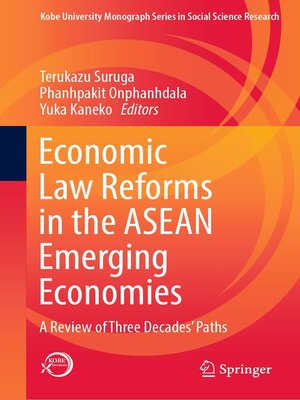Economic Law Reforms in the ASEAN Emerging Economies
ebook ∣ A Review of Three Decades' Paths · Kobe University Monograph Series in Social Science Research
By Terukazu Suruga

Sign up to save your library
With an OverDrive account, you can save your favorite libraries for at-a-glance information about availability. Find out more about OverDrive accounts.
Find this title in Libby, the library reading app by OverDrive.



Search for a digital library with this title
Title found at these libraries:
| Loading... |
This book reviews the periodic changes in the legal policies of the late-developing ASEAN countries, often known as the CLMV countries (Cambodia, Laos, Myanmar, and Vietnam), in their continuous path toward globalization after the collapse of the socialist bloc. The book also identifies the characteristics of the legal reforms in their present stage guided by the common framework under the ASEAN Economic Community (AEC) moving toward 2025.
The first stage is illustrated by the ASEAN-style utilization of foreign investments as reflected in all investment laws and policies of CLMV countries in the 1990s, which featured entry control (as "sticks") and investment incentives (as "carrots"). Those controls and incentives were the means to induce investors to assume various performance requirements to contribute to industrial policies. The second stage witnessed a shift toward enhanced liberalization as an endeavor toward the WTO accession during the 2000s, as seen in the integrated investment laws that appealed for the national treatment of foreign investors. At the same time, those investment laws emphasized the substantive provisions (e.g., fair and equitable treatment and indirect expropriation) and procedural protections (e.g., provision of Investor–State Dispute Resolution mechanisms) as an appeal for stabilization of the investment climate. The third stage of legal policy, as evidenced by the recent amendments to the investment laws, is newly focused on environmental and social considerations, which seems to be an indispensable response to the increasing social protests against the negative impacts of investment promotion. Simultaneously, the means of administrative controls over investors, established in the first stage, are uniquely utilized for the realization of new goals.





